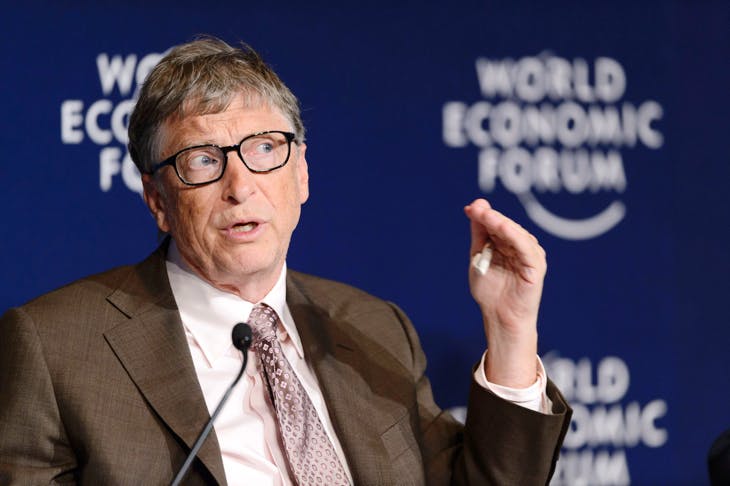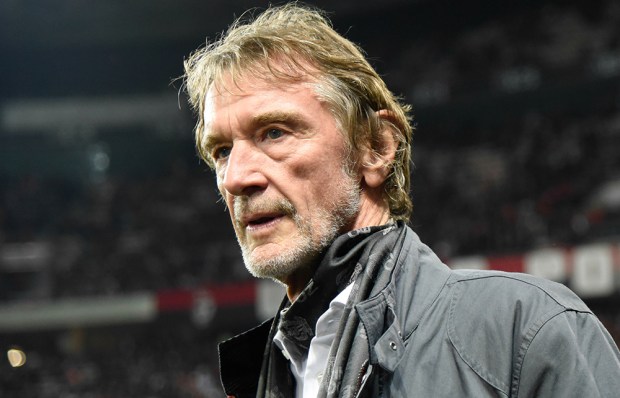I’ve objected before to the fact that supporters of Oxfam shops are unknowingly funding not only an aid charity but also a left-wing thinktank that promotes its beliefs with considerably more zest and clout than Jeremy Corbyn does. Its latest paper, An Economy for the 99%, issued to coincide with the gathering of the global elite at Davos, offers a killer factoid: that whereas three years ago the richest 85 people on the planet ‘had the same amount of wealth as the poorest half of humanity’, today that equivalence applies to just eight mega-billionaires, led by Bill Gates, Warren Buffett and Amancio Ortega, founder of the Spanish fashion chain Zara.
The Oxfam polemic, written by Deborah Hardoon, does not address the point that most of today’s giant fortunes are rewards for giant leaps in technology and choice that benefit billions of citizens, and would never have been created at all under the kind of redistributive regime Oxfam advocates. Indeed it entirely ignores the positive contribution of entrepreneurship to human progress. But still it illuminates the uncomfortable truth that the rich have been getting richer (at a claimed rate of 11 per cent per annum since 2009) while the poor have not. Davos Man may discuss inequality de haut en bas, but has no plan to narrow that gap and should be very afraid of its long-term consequences — of which the bizarre harbinger is the coronation of Trump.
Hardoon’s other sword-thrusts include the assertion, with which any man-in-the-street poll might nowadays agree, that ‘corruption and cronyism distort markets at the expense of ordinary people’. It’s not clear whether the bribery allegations behind Rolls-Royce’s £671 million settlement with US, UK and Brazilian authorities this week involved harm to ‘ordinary people’, but they certainly harm the reputation of a company whose name is supposed to be a synonym for British excellence. Likewise Rio Tinto, our premier miner, which late last year reported itself to regulators for bribes connected with an iron-ore project in Guinea. Having stepped beyond its raison d’être as an aid provider, Oxfam has reinvented itself as an opponent of modern capitalism — but modern capitalism in its big-corporate manifestation is still its own worst enemy.
As for cronyism, I stumbled on a vivid example recently when I met the former head of the European operations of a US multinational, who was boasting of his easy access to Conservative ministers. ‘But did you also have to go through one of those select committee show trials about how much you were paid?’ I asked. ‘Oh no, we just sent our public affairs guy to take the heat in the televised session,’ he replied, having omitted to ask me what I do for a living. ‘I insisted on a private hearing for myself.’ ‘How could you insist on that?’ ‘No problem, we had a friend on the committee.’
Beware markets and experts
The FTSE 100’s spectacular run has been fuelled almost entirely by the weakness of the pound — which slumped below $1.20 in anticipation of Theresa May’s Brexit speech, then shot past $1.23 as she delivered it. The share index dived accordingly; some pundits expect it to steady and go on climbing from 7,300 to 7,600, others see it falling back below 7,000 as foreign investors lose their nerve. Meanwhile, safe-haven seekers spooked by Trump and inflation resort to gold, pushing it to an eight-week high above $1,200 an ounce — but some experts say that too will fall back again as jitters recede, Trump’s expansion takes off and US interest rates rise. Ah yes, experts. Frankly, your guess is as good as theirs — and mine — in these strange times: my advice is sit tight and enjoy the inaugural show as best you can.
Ambassador Phil
Speaking of cronyism, while President Trump barks ‘Let’s go to work’, Reservoir Dogs-style, at the phalanx of former Goldman Sachs people who will run his administration, a colourful cast of his business pals and campaign funders waits in line for prestigious ambassadorships. This is an American tradition that has produced many embassy misfits in the past — the almost-invisible Texan horse-breeder William Farish, sent to London by George W. Bush, was a recent low ebb — but I’m hoping Trump’s picks will at least contribute some hilarity to a world in which only the Kremlin currently has anything to chuckle about.
Whoever he sends to the ambassadorial mansion in Regent’s Park has an unusually strong act to follow in Matthew Barzun, an internet pioneer and gifted communicator who was Barack Obama’s second appointee, following the bland Chicago banker Louis Susman. Barzun spent much of his tenure trying to reboot the ‘special relationship’ at ground level by travelling the country talking to young people. Current top tip as his successor is New York Jets football team owner ‘Woody’ Johnson, of the Johnson & Johnson pharmaceutical dynasty, whose claims to the post are that he can afford it and that he switched from fund-raising for Jeb Bush to endorse Trump. More provocative might have been business school professor Theodore Roosevelt Malloch, a right-wing ideologue who condemns the EU as ‘bureaucratic and socialist’ and says Trump’s triumph means ‘Davos Man is dead’; he was another early tip for London, but now looks a shoo-in to be Trump’s appointed troublemaker in Brussels.
Others hoping for new careers in diplomacy include a gallery of real-estate players, hedge-fund hot-shots and billionaires’ wives. But the one who really catches my eye is Trump’s Las Vegas business partner, the Runyonesque poker player and casino owner Phil Ruffin — whose chief contribution to international relations was to marry, when he was 72, a 26-year-old former Miss Ukraine. Trump, who was best man at the wedding, said last year he was thinking of picking Ruffin as his envoy to China. Ruffin dismissed the idea as a joke — but in the age of the Donald, joke and reality will be hard to distinguish.
Got something to add? Join the discussion and comment below.
Get 10 issues for just $10
Subscribe to The Spectator Australia today for the next 10 magazine issues, plus full online access, for just $10.















Comments
Don't miss out
Join the conversation with other Spectator Australia readers. Subscribe to leave a comment.
SUBSCRIBEAlready a subscriber? Log in